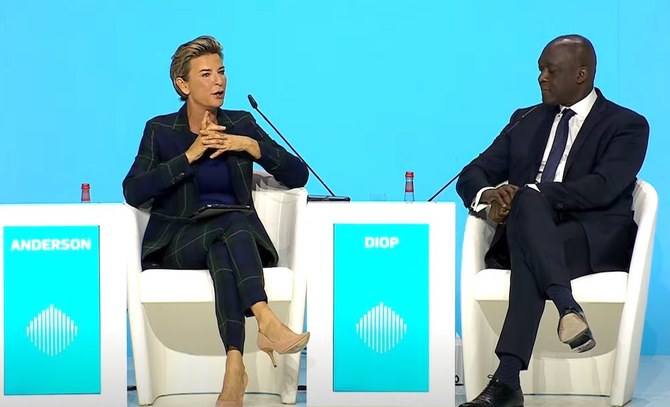DUBAI: For every $1 in grant money that the World Bank receives, it will mobilize $10 of its capital to invest in climate action, Makhtar Diop, managing director of the International Finance Corporation, told the World Government Summit on Monday.
“If we manage to have a bit more of investment of grant money, then we will be able to multiply investment significantly,” Diop told CNN’s Becky Anderson in a session titled “Investing in a sustainable future: the role of climate finance.”
Anderson said the climate crisis is one of the most pressing issues of our time.
“Mobilizing private capital alongside private policy is absolutely critical to transforming the world economy and putting us on a path to net zero by 2050. To reach that goal… as much as $9 trillion in investment is needed, every year. That’s one estimate. If you are more conservative, you might say it’s $6 or $7 (trillion), but that’s an awful lot of money, and 60 percent of those investment needs are in emerging markets. These markets are frankly starved of capital,” she said.
When asked about the funding gap for emerging markets and what should be done about it, Diop said: “The world doesn’t have a problem of resources but a problem of managing those resources to make sure we are using renewable energy…We also have a problem of managing the existing liquidity in the world and directing it to productive investment.”
Diop said it is estimated that $1 trillion per year will be needed to exert energy transition in many countries. What is missing, he explained, is a bankable project and liability for the private sector to assess the risk properly.
There are many factors, such as natural disasters and wars, that are rendering it difficult for investors to make decisions.
Diop said there is a need to de-risk those investments, which is what the IFC is trying to do by implementing a mechanism whereby bankable projects are brought together under one platform to simplify procedures.
Diop revealed that he is signing with the Abu Dhabi Development Fund an agreement to create a platform of $1.5 billion where both parties will co-invest in emerging countries around energy transition.
“Today, when we talk about green hydrogen, which is a new source of energy, it is mainly located in developing countries where you have the sun and hydro (power) in quantity,” said Diop.
These countries, he explained, “could become (exporters) of energy and (contribute) to the global public goods solution.”
Diop revealed that the World Bank Group is discussing an “evolution roadmap” to determine what more can be done to support energy transition and help countries fight climate change.
“This is a conversation that will require mobilizing more money because part of the resources of the WB Group are raised on the capital market and…not grant money,” he said.
What is needed, he explained, is certain technology that is currently expensive or the ability to invest in areas that are considered riskier in order to obtain more grant money.
























